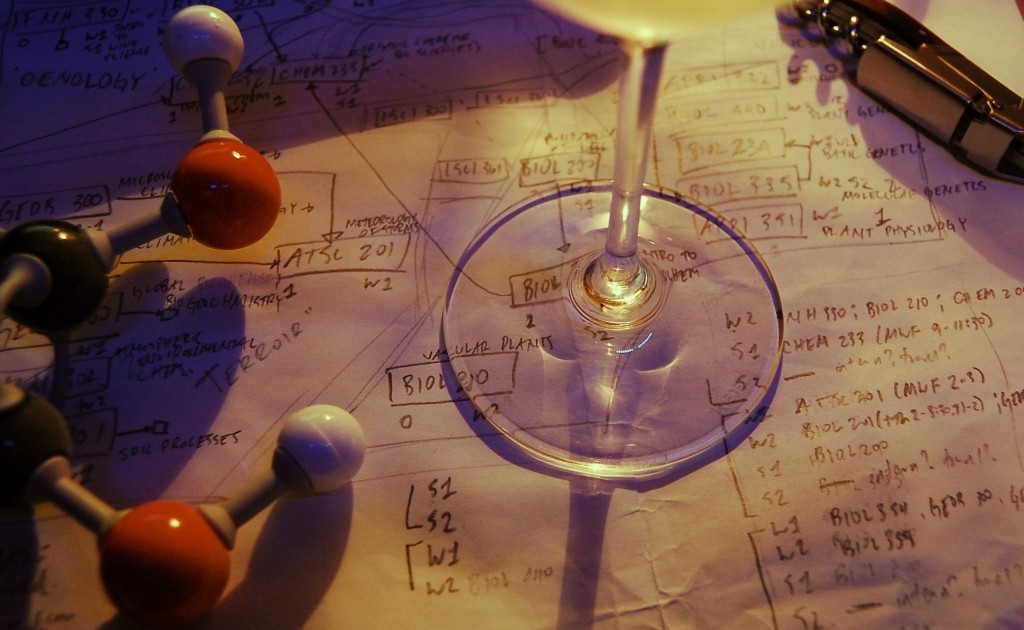Things change. People procrastinate. I am that complete snob in the fourth row of my algorithms class, reading about the granite soils of Beaujolais instead of listening to the professor show us how hash tables (hash functions? double hashing? hash keys? hash browns?) work. I’ve prepared the interview question but I’ve unsurprisingly never been asked: one of my biggest weaknesses is the fact that I’m interested in a vast amount of things such that I can often lose track, but at the same time, get really dedicated to an idea if I feel so inspired by it.
It was around a year and a half ago, where three of my best friends and I hung out after the riot-inducing Canucks playoff game. We didn’t stick around anywhere near the riots of course, and we got out of downtown just as we were able to spot rising smoke in a non-descript section of the city. We eventually decided to scarf down fried chicken and beer as if we were getting over a bad breakup. The topic of wine somehow came up, and I swore to them that I was pretty sure wine wasn’t just going to be a phase. But even then I had an inch of doubt after barely being in the wine game. Since then I’ve held a couple of private liquor store jobs. I don’t want to sound like I’m being self-righteous or anything, but working in liquor is, in theory, one of the most intense retail jobs there are – thieves, drunkards, minors, the insistently misinformed, the unnecessarily snobby. And I still sort of really love it all.
Today, wine finally wins the tug of war between it and Cognitive Systems despite my attempt to balance them. I’ve always been finding ways to combine the two: coding an artificial intelligent sommelier, for example, or doing a research assignment on artificial sensing systems that can taste foodstuffs. It’s tough combining a subject that’s so ancient while steadily morphing – like wine – with a subject so novel – like Cognitive Systems – where New York Times articles and TED Talks are listed as required readings. I constantly test and doubt my interests in both subjects: all it takes for wine is a scientific paragraph or diagram on malolactic fermentation or a taste of Premier Cru Burgundy at work, which gives me a boost of inspiration. The motivation provided by the conditioned satisfaction of a correctly functioning computer program or the promise of a futuristic world with an increasing need for degrees like Cognitive Systems is slowly dwindling. Maybe I’m just impatient, but I’m pretty sure I’m mostly bored or uninspired.
Completing the WSET Diploma has always been on the silent secondary to-do list along with what was my major. The problem with WSET is that I don’t find it scientifically satisfying – so far, at least. Some books may casually mention esters, pyrazines, or micro-oxygenation (to name a few), but don’t go deeper than a brief description. I don’t blame them, though, because I would guess that much of the WSET qualifications are aimed towards the hospitality and business sides of wine. But when you look at the titles of viticulture + oenology theses from UC Davis or project titles from the UBC Okanagan oenology lab and legitimately don’t yawn at them – and even better, actually wanting to read the research papers – it’s probably a sign. I find this mystifying because I thought I hated biology and chemistry. I had the impression that freshman year (in Science) served to be the pencil that you used to cross off the options on your list. Now it’s a couple years later and I’m more than willing to use the eraser and dive back in.
Sure – UBC Okanagan offers a Biochemistry degree with a “Wine Option”, which from the looks of it, includes a handful of botany and oenology courses along with the recipe of a biochem degree. The closest thing that the Vancouver campus has to an oenology course is the FNH 330 (Introduction to Wine Science) course, which I hear covers around the same material as WSET Level 1 and 2 with a cup or so of science (I feel unnecessarily snobby by shrugging at that and saying that it’ll be a grade booster). And despite the fact that this campus has an extensive wine library, it’s astounding to me that there’s no real oenology/wine-themed program, but only other related programs: Food Science, Horticulture, Global Resource Systems, Applied Biology, Botany, Soil Science.
I’ve decided to major in Integrated Science, where I’ll have the opportunity to combine courses from several disciplines and essentially design my own degree. Something that I noticed that many other oenology or viticulture programs don’t include are courses to do with the climate and the idea of terroir, seen from a scientific perspective. My integration will be: oenology (mainly biochemistry), viticulture (mainly botany and genetics), and terroir (mainly soil and atmospheric science). My integration will also include a dash of economics-themed courses, which, along with the first unit of the WSET diploma, will strengthen my knowledge of the business side of wine.
I’ve written paragraphs on paragraphs about how excited I am, but watch me change my mind in 2 years and delay my undergraduate degree yet again. It’ll be something weird, like dentistry. Or German literature.
